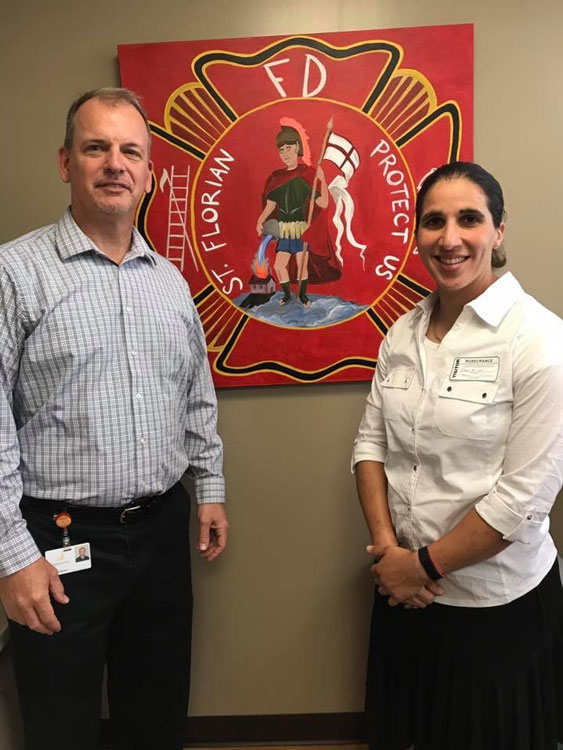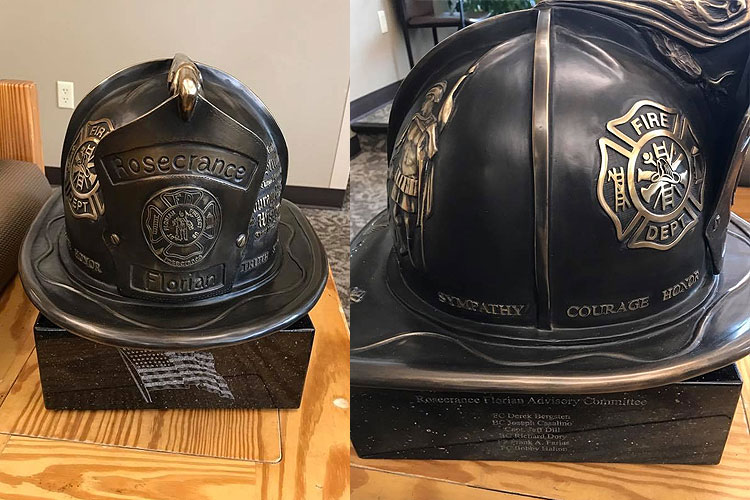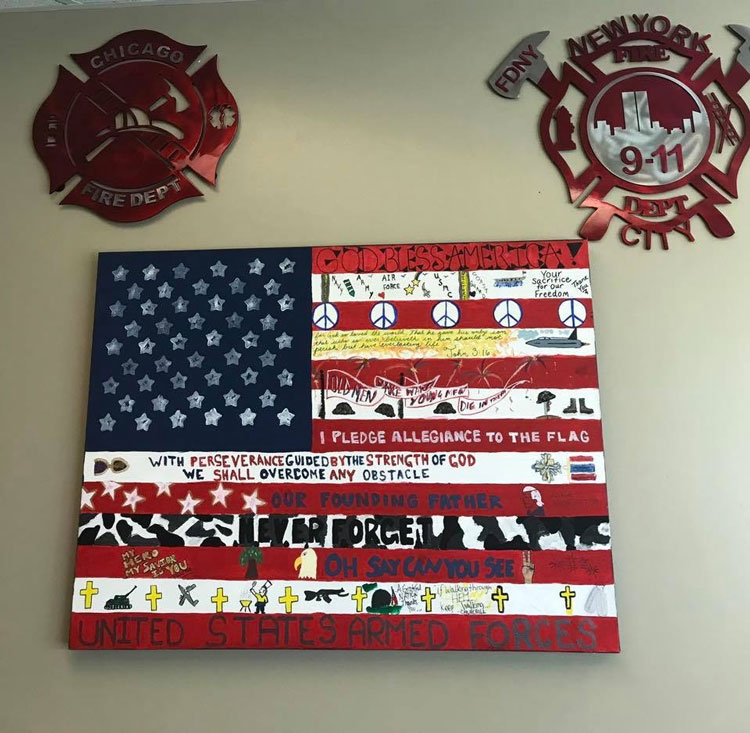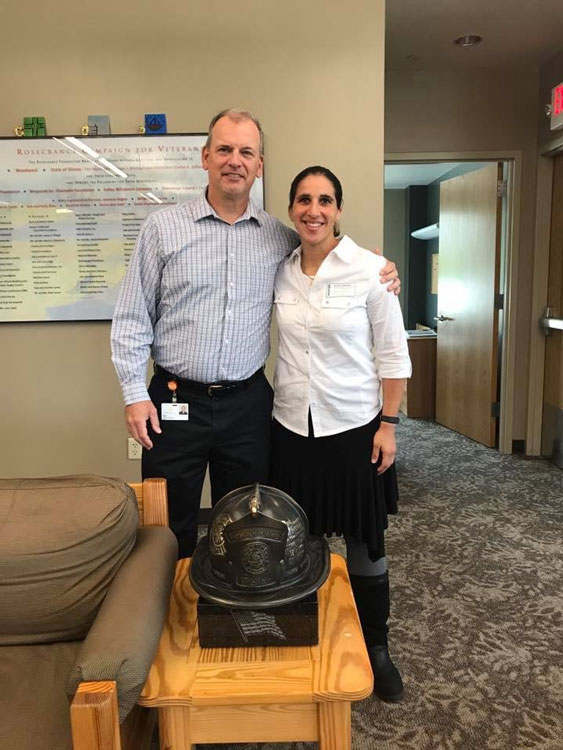

(L-R) Dan DeGryse and Dena M. Ali.
By Dena M. Ali
Last week, I had the opportunity to tour the Florian program at the Rosecrance treatment center in Rockford, Illinois. Rosecrance has been treating first responders since 1995, opened a Florian unit dedicated to firefighters in May of 2014, and expanded its mission to treat all uniformed and military personnel in January of 2017. My experience at Rosecrance-Florian compelled to write a summary to help educate others on this private, not-for-profit resource.
While attending the 2017 Fire Department Instructors Conference (FDIC) International in April, I met Chief Dan DeGryse of the Chicago (IL) Fire Department, who also serves as the Director of the Rosecrance Florian Program. We share a common interest in firefighter emotional wellness and the desire to learn as much as possible about prevention and education of mental health disorders such as alcoholism and suicide.
Chief DeGryse is unique because his experiences include personal, professional, clinical, and research based understanding of firefighter emotional wellness. He brings abundant knowledge and experience to this field with a degree in psychology, advanced training in Critical Incident Stress Debriefing (CISM), Certified Employee Assistance Professional (CEAP), and a Certified Alcohol and Drug Abuse Counselor (CADC). Additionally, he spent six years working as a counselor at a private hospital and provided peer support after the events of September 11th, 2001.
RELATED: Strategies for Preventing Suicides in the Fire Service | South Carolina Firefighters Receive Suicide Prevention Training | FDIC International 2017 Class: Firefighter Suicide Prevention Approach
Chief DeGryse has a simple goal–he wants to share his knowledge with those willing to learn and share the message of firefighter emotional wellness and creating a culture of acceptance.
Importance of Firefighter Emotional Health:
Research on firefighter emotional health has led to a few conclusions:
· The stigma attached to help seeking behavior prevents first responders from admitting when they need help.
· Suppressing emotions, ignoring warning signs, and attempting to hide personal problems can result in a major crisis for the individual.
· Alcohol is the most common substance utilized to cope with depression and mask the signs of stress.
· Loss of support and isolation are huge risk factors for first responders, and positive social support serves as a protective factor.
· Sleep difficulty and insomnia are risk factors for depression and suicide; shift work negatively impacts sleep quality, length of sleep, and mood.
· Suicide is a concern for first responders because it can be the end result of undiagnosed/poorly managed mental health disorders.
Psychological autopsy studies of suicide decedents return rates of mental disorders well over 90%, and Dr. Thomas Joiner believes this number could be closer to 100% (Joiner, 2015, pg. 242). These mental disorders include (but are not limited to) PTSD, depression, anxiety, and substance abuse. This is just one reason why treatment centers such as the Rosecrance-Florian are essential for first responders suffering from co-occurring substance use and mental health disorders.
Though there is only one Florian unit (named for the patron saint of firefighters), Rosecrance has over forty locations in three states. They provide evidence-based practices to treat clients with a goal to deliver the best resources to support lasting recovery. Chief DeGryse serves as the Director of the Florian unit on the Harrison campus in Rockford. His one-of-a-kind unit specializes in serving firefighters, police officers, paramedics, and members of the armed services. He recognizes that these individuals need both substance abuse treatment and care for job-related post-traumatic stress disorder, anxiety, depression and/or other behavioral health issues. The Florian unit treats both men and women and is available for any member of public safety in the United States.
|
|
 |
 |
Road Trip with Chief DeGryse:
I met with Chief DeGryse at his house and rode with him for the 90-minute trip to Rosecrance-Florian. We discussed the efforts to address firefighter emotional wellness and the importance of peer support. Chief DeGryse noted that functioning peer support teams can help prevent responders from utilizing alcohol or other substances as coping mechanisms and, in turn, may prevent some from reaching the point where inpatient treatment is required.
As noted earlier, loss of social support is a major risk factor for mental health disorders and suicide, and positive social support can serve as a protective factor. Peer support is one layer of protection, allowing responders to feel comfortable opening up to their peers. Matt Olson, Director of Program Development for the Illinois Firefighter Peer Support (ILFFPS) team and the nation’s premier educator on peer support teaches to simply, “make it safe.”
RELATED: The Rosecrance Florian Program | Don’t Have Any Regrets: The Rosecrance Florian Program
“Making it safe” means facilitating a culture in public safety that allows members to talk to one another and ask for help when it’s needed. Members must be able to admit when they become confused by their emotions or are not emotionally well without fear of repercussion. Peer support helps responders recognize their emotions are normal, even when they’re uncomfortable or overpowering. Olson teaches peers to listen, relate, and validate. Peer supporters are not a substitute for therapeutic services, mind you, and peers are not trained as mental health professionals. Their job is not to solve a problem or counsel, but rather simply be present and offer an ear. During training, peers are taught best practices and educated on high-risk behaviors that require referral to a counseling professional. I have personally benefited from peer support and recognize the importance of simply being heard, understood, and told that what I am feeling is normal. The power of social support and feeling normal is invaluable with the help of a peer; and, tough times become easier to navigate and begin to make sense.
Rosecrance-Florian Treatment Center
Once we arrived at the Florian unit, I quickly saw the power of peer support that Chief DeGryse instills in the curriculum. He showed me a full schedule that includes classes, activities, and therapies scheduled seven days a week from 06:45a.m until lights out at 10:30p.m. Clients have little time alone during the day. The schedule consists of numerous group activities and classes including fitness, meditation, Cognitive Behavioral Therapy (CBT) for PTSD, Co-Occurring disorder program, art therapy, and group process.
Chief DeGryse understands that not every firefighter, paramedic, or police officer will be able to travel to the Florian unit for treatment, and he recommended a few features to look for when choosing any other treatment center:
· Ensure the schedule is maximized with evidence based treatments and activities.
· Determine the amount of therapy provided.
· Determine the certifications of the counselors.
· Examine billing procedures.
· Understand waitlist procedures.
Florian seeks to provide a minimum of five hours a day of group therapy sessions. They have dedicated resources to handle all public safety requests. Access Liaison, Kasidi McKeon, ensures first responders are placed at the front of the list with no wait for treatment. They even facilitate transportation from the airport.
My favorite part of the facility was the art room, which is overseen by Jada Miller, a Licensed Clinical Professional Counselor and Art Therapist. She has been with the facility for seven years and in that time has acquired some impressive, detailed, and meaningful artwork. The current project on display is titled, “Behind the Mask.” During my research, one reoccurring theme among distressed responders was that they “wore a mask” to disguise their emotions. The Behind the Mask project provides visualization of the masks that are often worn as defense mechanisms. The outside of the mask represents their professional face, and the inside represents their internal self, the side kept hidden. These masks were all different, yet spoke volumes in a common language about the sense of responsibility first responders develop.
Attending Group Therapy
The clients receiving treatment in the Florian Unit allowed me to attend their group symptomology management session. The ten of us sat in a circle of chairs, and Chief DeGryse lead a conversation about the importance of both sleep and peer support.
As the group began talking, I saw that not all of the members participated equally. Out of the eight clients present, three dominated 70% of the verbal discussion, and two others consumed about 25% of the conversation. What was eye opening to me was the nonverbal communication. Though three remained silent, their facial expressions and mannerisms spoke volumes. They didn’t have to speak for me to recognize that they were a part of the conversation, and were processing and reacting to what was being said.
Chief DeGryse addressed peer support with a blunt question; he asked if anybody in the group felt they were isolating themselves and not connecting with others. One member raised his hand and admitted that he simply does not feel comfortable with the group, so he tries to isolate as much as possible. Chief DeGryse then asked the group if they noticed this behavior. Three members in the group raised their hands and admitted to recognizing the isolation. Chief DeGryse asked if any of them checked on the client, or attempted to reach out to him. Only one member admitted to reaching out. Chief DeGryse used this example to reinforce the importance of peer support and the power of simply checking on others who are behaving differently or isolating themselves.
Another client (admitted for only three days) interrupted and said, “I’ve been dying for somebody to just to ask me how I’m doing because I’ve been holding so much in and it’s killing me.” The client began crying, and their honest admission was a great reminder of a simple fact: sometimes people just want an opportunity to be heard.
I gained respect for Chief DeGryse when we talked about the importance of sleep. He asked if anybody utilized substances to help them sleep, and admitted that he drinks coffee (stumped me too) or eats food to help activate his parasympathetic nervous system. Chief DeGryse showed that he is just as human as everybody in the room and subject to poor habits. During the group session, he did not draw a line between himself and the clients, or speak above them. This small act, I realized, helped to break a client/clinician barrier and enabled the group to feel comfortable and speak freely without fear of judgment.
At the end of the session, several clients told Chief DeGryse that they look forward his sessions the most, because they never feel judged and they can open up. Chief DeGryse made the group sessions “safe”.
The Florian Program is a private, not-for-profit resource that serves all uniformed and military personnel nationwide. Every staff member I met had a genuine desire to serve those who serve their community. However, they can only help if fire, police, and EMS departments are willing to learn more about the Florian and its valuable services.
DENA M. ALI is a captain with the Raleigh (NC) Fire Department and an EMT Intermediate with Wake County (NC) EMS. She has a bachelor’s degree and is a graduate student at the University of North Carolina, Pembroke, where she is pursuing a degree in public administration. She is a founding member of the Carolina Brotherhood and a fitness advocate with 555 Fitness.


